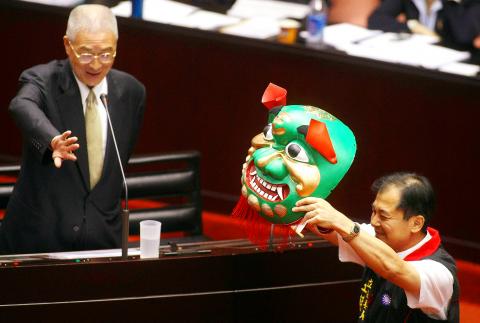Chinese Nationalist Party (KMT) Legislator Herman Shuai (帥化民) yesterday took aim at President Ma Ying-jeou’s (馬英九) idea to use the name “Taiwan Academy” for the proposed culture institutes to be established overseas, proposing that the name Zhonghua, or “Chinese,” be used instead.
During a question-and-answer session with Premier Wu Den-yih (吳敦義) in the legislature, Shuai said the government should either replace the name “Taiwan Academy” with “Chinese Academy” or remove elements of Chinese culture from the academy’s mandate.
Shuai said he failed to see why the country chose not to vie for an orthodox position in spreading Chinese culture when China has established its Confucius Institutes around the world.

Photo: CNA
Chinese culture was devastated in China during the Cultural Revolution when Confucianism came under attack and the Qin Shi Huang (秦始皇) was honored, but now the Chinese government had regained the power to speak for Chinese culture, Shuai said.
Chinese culture was brought to Taiwan by former presidents Chiang Kai-shek (蔣介石) and Chiang Ching-kuo (蔣經國), the lawmaker said.
“We have the strength to spread Chinese culture, but we are opening ‘Taiwan Academies.’ Why are we being so coy?” Shuai asked.
Setting up Taiwan Academies was one of Ma’s campaign promises as part of his efforts to secure the nation’s role in spreading what he called “Taiwanese culture with Chinese characteristics” and pushing the use of traditional Chinese characters, as opposed to the simplified characters used in China.
The first Taiwan Academy is scheduled to open on Friday in New York, where an inauguration ceremony will be held at the Taipei Economic and Cultural Office.
Wu said using the name “Taiwan Academies” was meant to emphasize their origins.
“If we named them ‘Zhonghua Academies,’ would foreigners understand what it stands for? Are you saying we need to add ‘Chinese Taipei’ or ‘Chinese Taiwan?’” Wu asked.
For example, major league pitcher Wang Chien-ming (王建民), fashion designer Jason Wu (吳季剛) and Taitung vegetable vendor-philanthropist Chen Shu-chu (陳樹菊), who was named one of the most influential people by Time magazine last year, were “proud of Taiwan,” not “proud of Zhonghua” because that was unknown to foreigners, Wu said.
Two branches of the Taiwan Academy will also be opened in Los Angeles and Houston on Friday.
Also during the session, KMT Legislator Chu Fong-chi (朱鳳芝) asked Wu to share his views on former Singaporean prime minister Lee Kuan Yew’s (李光耀) recent remarks that no country would support Taiwanese independence, that unification between Taiwan and China was just a matter of time and that it could happen in 10, 20 or 30 years.
Wu said he respected Lee’s views, but disagreed with him on the estimated time frame for unification.
“The time frame is too short. It could be 50, 80 or 100 years, as long as Taiwan does well. Other than economic reform, China needs to work toward political reform, human rights, democracy and rule of law,” Wu said.
“There are various possibilities for future cross-strait developments, but the government is maintaining the ‘status quo’ of the Republic of China, which is ‘no unification, no independence and no use of force,’” Wu added.

Three Taiwanese airlines have prohibited passengers from packing Bluetooth earbuds and their charger cases in checked luggage. EVA Air and Uni Air said that Bluetooth earbuds and charger cases are categorized as portable electronic devices, which should be switched off if they are placed in checked luggage based on international aviation safety regulations. They must not be in standby or sleep mode. However, as charging would continue when earbuds are placed in the charger cases, which would contravene international aviation regulations, their cases must be carried as hand luggage, they said. Tigerair Taiwan said that earbud charger cases are equipped

Foreign travelers entering Taiwan on a short layover via Taiwan Taoyuan International Airport are receiving NT$600 gift vouchers from yesterday, the Tourism Administration said, adding that it hopes the incentive would boost tourism consumption at the airport. The program, which allows travelers holding non-Taiwan passports who enter the country during a layover of up to 24 hours to claim a voucher, aims to promote attractions at the airport, the agency said in a statement on Friday. To participate, travelers must sign up on the campaign Web site, the agency said. They can then present their passport and boarding pass for their connecting international

Temperatures in northern Taiwan are forecast to reach as high as 30°C today, as an ongoing northeasterly seasonal wind system weakens, the Central Weather Administration (CWA) said. CWA forecaster Tseng Chao-cheng (曾昭誠) said yesterday that with the seasonal wind system weakening, warmer easterly winds would boost the temperature today. Daytime temperatures in northern Taiwan and Yilan County are expected to range from 28°C to 30°C today, up about 3°C from yesterday, Tseng said. According to the CWA, temperature highs in central and southern Taiwan could stay stable. However, the weather is expected to turn cooler starting tonight as the northeasterly wind system strengthens again

Taiwan sweltered through its hottest October on record, the Central Weather Administration (CWA) said yesterday, the latest in a string of global temperature records. The main island endured its highest average temperature since 1950, CWA forecaster Liu Pei-teng said. Temperatures the world over have soared in recent years as human-induced climate change contributes to ever more erratic weather patterns. Taiwan’s average temperature was 27.381°C as of Thursday, Liu said. Liu said the average could slip 0.1°C by the end of yesterday, but it would still be higher than the previous record of 27.009°C in 2016. "The temperature only started lowering around Oct. 18 or 19